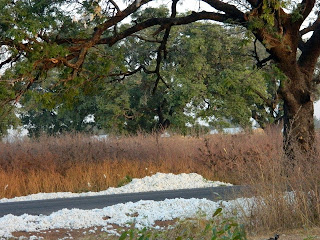Monkolé is a tonal language, which
means that someone's tone of voice rising, staying the same, or
lowering on one syllable of a word can change the whole meaning of
the word. A simple example is the following word pair:
ajá (with
rising tone on the final "a") means "dog"
ajà
(with
low tone on the final "a") means "market"
The
tones are not crucial most of the time in Monkolé. Someone who heard
me say, "I went to dog to buy some tomatoes" would pretty
easily figure out what I meant, though they might have a bit of a
laugh at my expense. For this reason, the majority of tones don't
need to be marked when Monkolé is written – and it's a good thing
too, as the page would look very messy!
Sometimes, though, we can get tripped
up.
In Isaiah 30:13, the Lord is speaking
to the people of Judah who are seeking Egyptian help rather than
relying on Him. He says to them:
"this
sin will become for you
like a high wall, cracked and bulging,
that collapses suddenly, in an
instant." (Isaiah 30:13,
NIV)
Our draft Monkolé translation says:
Kurara iyi bɛ á yɛi bi tu ŋɛ
bɛi bindi kugboka iyi í la,
nɔ í cuku anu akã.
When I first read this, I understood it
as "this sin will be to you
like a high wall which is big, and which falls all of a sudden".
'í la' is a common construction meaning 'it is/was big', and
although the 'la' is said with a rising tone, it is unnecessary to
mark the tone.
So
I said to the translators, "I think we need the idea of the wall
being cracked already."
Pastor
Samuel said, "But we do!" and I suddenly remembered another
use of 'í la' (with low tone) and said, "Oh, that's what this
'í la' means, isn't it?"
I
was feeling a bit silly for not realising, until Philémon said, "Oh,
but that's how I read it too!"
So
we decided we needed to write this 'í la' with a low tone, ie. 'í
là', to prevent other readers reading the most common
meaning of 'í la'.
This
shows how we sometimes have to spend three or four minutes just
discussing one tiny mark over a letter! Yet that mark can change the
meaning significantly.







